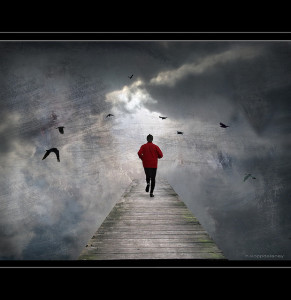
Photo by h.koppdelaney
Our actions and behavior are a result of our thoughts and emotions; which in turn are dictated by our conditioned beliefs. In order to experience real change in our life, we need to start by examining our underlying beliefs. One of the most powerful subconscious beliefs, that powers our life, is that achieving certain goals in the future will somehow resolve most of our challenges of the present. It is our deep-rooted belief around ‘doing, having, and being’.
Doing, Having and Being
Consequently, we are possessed by the mental commentary that once I can do this (get promoted, expand my business, lose weight, get my kids to college), I will have that (more money, success, time, recognition, friends) and I will be there (happy, fulfilled, connected, proud, grateful). While there’s some truth to that, particularly in the short-term, in the broader sense, it is an illusory belief.
For example, when the much awaited promotion does come along, we quickly realize that we do not necessarily have the extra time we had longed for or the sense of fulfillment we had conveniently assumed. On the contrary, not only do we become busier, but also find ourselves setting sights on the future goal – the next promotion. In the process, we routinely put our life on hold and keep postponing our happiness to another day in the future.
From Doing to Being
To transform our life to be more meaningful and happy throughout its journey, we need to reform this belief. We need to alter the sequence of the above belief to ‘being, doing, and having’. We need to start with what we deeply want to be, and let that guide us on what we do and have trust that with that, we will have all that we need to have.
For example, ask yourself whether you would like to be more successful or happier. If you had to make a choice at work, who would you rather be – a Happy Vice-President or an Unhappy Senior Vice-President. While being happy and getting promoted don’t have to be mutually exclusive, consciously making the above choice is important as it can determine what you pay greater attention to on a daily basis.
That in turn dictates what you get engaged in, how you structure your life, what you receive, and how you feel. If you choose to be the Happy Vice-President, that doesn’t mean you stop putting in the committed effort at work, it’s just that you become more conscious of the underlying emotional journey and prefer not getting stressed by the daily ups and downs at the workplace.
Then we no longer single-mindedly pursue our career ambition; instead, we actively invest in honing the skills to be happy and nurturing our inner well-being, alongside, and not as something we wish to materialize as a future reward of our success. Ironically, plenty of research suggests that happier individuals make better leaders in any case – they tend to operate from a greater sense of inner security, relate better to their colleagues, and have a more positive outlook towards their circumstances.
Who we are determines what we attract in life
We do not attract in our life what we want but who we are. In Ralph Waldo Emerson’s words, ‘What you are comes to you.’
While altering pieces of our environment – job, location, partner – can sometime support changing our experience, for the most part, unless we work with reforming who we are being we continue to attract unpleasant situations that recur in our life. We continue to land ourselves with an overbearing leader, until we learn to be assertive; attract toxic relationships in our life, until we choose to be more loving and respectful of ourselves; find problems with every location we move to, until we learn to be more positive about life.
The reality is we have these choices all the time and who we choose to be at each moment shapes the direction of our life’s experiences. Once we make the shift towards prioritizing our inner state of being, it has a positive impact on every outer aspect of our life.
We shift from ‘Let me get though this busy phase and then I will organize myself’ to ‘I need to be organized (so I can get through this busy phase)’; from ‘I need to control the kids now, when they are mature I will be more hands-off’ to ‘I need to be more hands-off now (so the kids can become more mature); and from ‘Once I can lose weight, I will love my new self’ to ‘Learn to be more loving to myself (and I will become healthier)’.
More examples of how we can be
Here are some more examples of how we can begin to start making a shift from things to do to a new state of being in our every day life.
Things to do….…………………Replaced with state of being
Build a career…………………….Be in sync with my calling
Plan my day………………………………..……Be organized
Follow my priorities…………………………….Be disciplined
Spend time with children…….…………………Be connected
Holiday with wife……….…….……..…………….…Be loving
Attend more social dinners……………………….……Be fun
Grow my network………..……………………….Be engaging
Work towards the next promotion…………….Be committed
Rehearse an important presentation…………….Be confident
Make things go my way……………………….…Be detached
Perfect the things I do..………………………Be wholesome
Support my spouse…………………………….Be committed
Earn more………….………………………………Be content
Exercise regularly…………………………………Be healthy
Learn more……………………………………………Be wise
Meditate regularly…………………………………Be present
(This is an expanded version of an article I had recently written on the Heal Your Life website)











 The Unexpected Positive Shifts Triggered By Covid Crisis
The Unexpected Positive Shifts Triggered By Covid Crisis Passionate Detachment: The Sweet Spot of Life
Passionate Detachment: The Sweet Spot of Life Artha, Kama, Dharma, Moksha and The Sweet Spot of Life
Artha, Kama, Dharma, Moksha and The Sweet Spot of Life Our Preoccupied Minds and Living in the Now
Our Preoccupied Minds and Living in the Now Overcoming the Crippling Thoughts of ‘Why Me?’
Overcoming the Crippling Thoughts of ‘Why Me?’
Well expressed, with much clarity.
The relation between being-doing and how the reversal of the order from the general doing-being, and what it means, has been expressed and explained, very beautifully, in Neale Donald Walsch’s Conversations with God series, as well.
Thanks for sharing yet another wonderful sharing, towards the healing of the composite units of this world, and thus, towards the healing of the world in its entirety.
Warm regards and wishes,
Wonderfully articulated, this is 100% true in my experience
Thanks for sharing
Fantastic article sir, each time I read your blog I get rejuvenated and it helps me think and look at things in a different perspective altogether. Thank you for adding another piece of information on your blog list. 🙂 Cheers!
Really required some peeping, thats exactly what this article has done. Many thanks Rajive, i am fan of yours for sometime now.
Sir, explained in a very simple and effective language. If any one reads this article and relates with what is going on in his life, or what has happened in the past,or where he stands today is because of this underlying belief, doing, having and being. All along since childhood this has been ingrained into our mind, body and everything as you have mentioned a running commentary going on continuously.Look forward to such more articles.
Warm regards
Vij,
Thanks for having me in your mailing List and as always thought provoking and induces in to making defenitive action.
I’m a bit confused. Would the next step be to find out what actions define these states of being? If so would that not put you back where you started? For example you use be organized to replace plan my day. Well, being organized is a description of action. If I asked myself: “how can I become organized?” It would inevitably lead to actions organized individuals take such as sorting and micromanagement.
Now I am back where I started. If I can sort and micromanage then I can be organized. Perhaps, the actions we take determine out state of being. We just have to analyze the behaviors that create such a state and apply them to our lives.
I am very sorry. It is a deep article but, if anything it exposes a cycle that cannot be avoided and instead should be closely observed be each of us to be more mindful of who we are.
Many thanks for sharing your observation, appreciate it. While at first glance it can seem that way, but the fundamental distinction between the two approaches is the following – ‘doing’ generally focuses on a specific outcome, whereas ‘being’ is a state of being irrespective of specific outcomes. Now, the chosen state of ‘being’ would generally help us achieve the desired outcomes, but when we are committed to our state of being, we are not biased by the accomplishment of the specific outcomes particularly in the short term.
For example, going on a diet may help us lose weight but choosing to be healthy directs us to take a holistic and a healthier approach to our body and mind (overtime, it may help us lose weight too, but that’s not the only outcome we are after).
Likewise, consider another situation. A Dad decides to carve out an hour in the evening to play with his kids. At the planned time, the kids are tired and in no mood to play. If the parent is driven by the “to do” approach, he is likely to judge the situation from his perspective and maybe disappointed at the prospect of not being able to play with them and DOING his bit with the kids. However, if his focus were to be towards using the time to “being connected with the kids“ (a BEING approach), he couldn’t care less whether the kids want to play or chat or just wander around – he will BE CONNECTING with them in all situations.